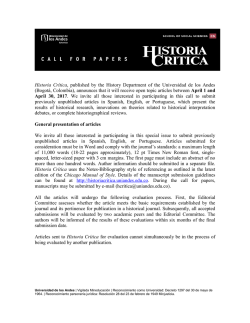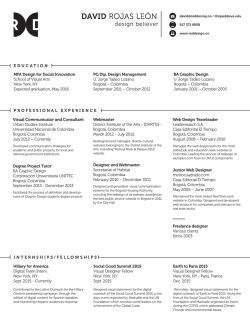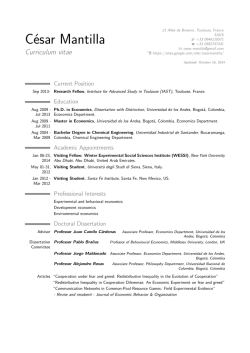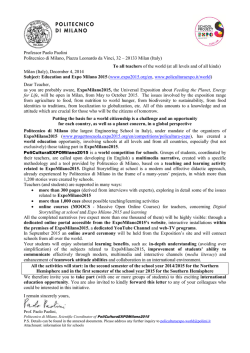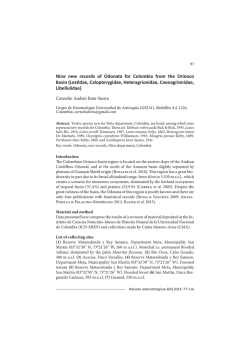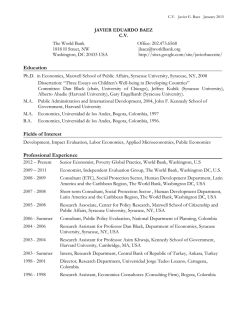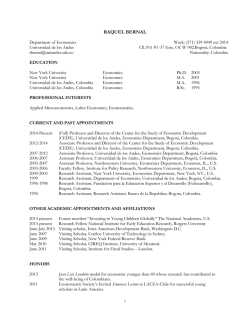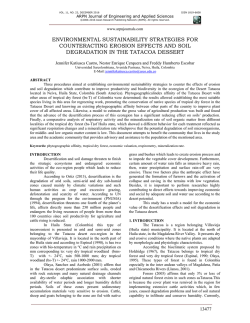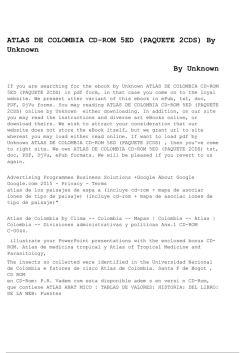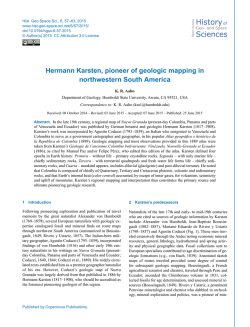
Summer School - Ingegneria Senza Frontiere
Summer School Engineers without borders- Colombia http://isfcolombia.uniandes.edu.co/ invites you to participate in engineering courses with community work and social impact in a Colombian rural community. Engineers Without Borders Colombia seeks to combine efforts of joint work between various faculties of engineering to propose real projects that have a significant social impact on Colombian communities. The Engineering courses will be in Universidad de los Andes at Bogotá Colombia, https://www.uniandes.edu.co/component/content/article/656-about-uniandes Summer school 2015 Investment The Summer School 2015 offers three courses in parallel and a transversal project to be conducted with a community in Guasca Cundinamarca (50 km from Bogotá). International students from partner universities to the University of the Andes will not have to incur costs for the course and transportation to the community. One must assume the costs of lodging and tickets. The dates Approximate average room and board cost is US $ 30 per day From June 22 to July 3, 2015. The courses will be in the morning. Registration Deadline is on May 29th. For registration please provide your information via email to: [email protected] Invitation You could choose one of these 3 engineering courses: Industrial Engineering Course: Social Innovation and Management This international course aims to bring together faculty and students from home and abroad for the dissemination of knowledge universities, cultural exchange and discussion on the role of engineering in promoting community development, particularly from the most vulnerable. Through the concepts studied in the course and a visit to a vulnerable community, students must observe the social context and stage of development of the community, identifying management issues that can be addressed from engineering and social intervention. From this analysis, students must conceive and design engineering solutions that seek to improve or solve these problems at technical level and social development. We will focus on issues related to water management as a potential development for vulnerable communities around the world. Participatory work methodologies that enable the development of efficient management models with high social impact .The course through the alliance of years of work between Ingegneria senza Frontiere-Milano is done will be presented (http://isf.polimi.it/isf./) Italy and Engineers without Borders Colombia (http://isfcolombia.uniandes.edu.co/). The teachers are: Irene Bengo Post Doc researcher, Department of Management, Economics and Industrial Engineering at Politecnico di Milano. President of Engineers Without Borders Milan http://isf.polimi.it/isf/. Managerial Professor, Master in Environmental Engineering with a PhD in Management, Economics and Industrial Engineering. Currently manager of social entrepreneurship projects for the generation of employment opportunities at national and international context (Africa, Colombia, Pakistan) María Catalina Ramirez Cajiao Associate Professor, Department of Industrial Engineering at the Universidad de los Andes Bogotá Colombia. Co-Founder and UniAndes Coordinator of Engineers Without Borders Colombia http://isfcolombia.uniandes.edu.co/. Industrial Engineer, Master in Industrial Engineering with a PhD in Management, Economics and Industrial Engineering of Politecnico di Milano. It has promoted the group EWB Colombia. Currently involved in entrepreneurial projects and community management associated with Green Business and Water Management. Mechanical Engineering Course: Renewable technologies Energy: the global scenario and its role for a sustainable development This course aims to present a general overview and specific in-depth analysis of the various aspects of the global energy situation, analyzing in particular the relation between energy, environment and development. The specific objective is to provide students knowledge of the problems regarding the availability, potential and economics of the primary energy sources. They are divided into fossil fuels and renewable energies with emphasis on the technology specific to each one and the link between energy and sustainable Riccardo Mereu Research Associate and Adjunct Professor at Department of Energy of Politecnico di Milano. His main interests are fluid dynamics and heat transfer phenomena in single and multiphase flows in the energy field, with main focus on numerical modeling. He his actually lecturer of Fundamentals of Energy Sciences for energy, environmental and nuclear bachelor students at Politecnico di Milano . Vice-president of Ingegneria senza Frontiere - Milano http://isf.polimi.it/isf/ (Engineering Without Borders Milan), member of the Energy Group and social-economic development. In the first part of the course the actual global energy scenario and related forecast in term of overall and specific indicators for High, Middle and Low Income Countries are discussed. The environmental and economic aspects related to energy production with focus on renewable energies are also presented. Finally, an overview of the local Colombian and European energy situation and its specificity is provided. The second part of the course offers an insight into the main renewable technologies for distributed generation (solar, wind, mini-hydroelectric and biomass) with a theoretical overview and application to the design of the major plant characteristics with related application in projects for local sustainable development in different contexts. responsible of different international projects focused on the use and development of appropriate technologies in the energy field. He was involved as consultant on ICS -UNIDO training activities (e‐learning courses and local intensive training courses) about energy technologies. Andrés González Mancera Profesor Asociado del Departamento de Ingeniería Mecánica de la Universidad de los Andes en Bogotá-Colombia. Ingeniero Mecánico y Doctor of Philosophy, University of Maryland, Estados Unidos. Photo by: Diana Maria Duarte Electronic and Electrical Engineering Course: Humanitarian Feedback Control Engineering An overview of poverty and sustainable development in the world will be provided, followed by an analysis of a feedback control strategy that serves as a financial advisor for the poor, and an analysis of the dynamics of the tragedy of the commons as it connects to sustainable development. Some principles of social justice will be covered, along with a computational analysis of a distributed feedback control Kevin Passino Professor of Electrical and Computer Engineering at The Ohio University USA. Director of the Humanitarian Engineering Center in The Ohio State University USA https://osuhe.engineering.osu.edu/. His current research areas are Interdisciplinary engineering-social sciences research on systems and feedback control theory/engineering, stability analysis, optimization, and game theory for human social, economic, and political systems; group dynamics and decision making (e.g., for communities); design and etvaluation of complex, large scale, and distributed "sociotechnological" dynamical systems that involve groups of humans using technologies. Applications of all these to humanitarian engineering. Interdisciplinary engineering-biology research on distributed decision-making systems, with a special focus on honeybee social foraging, social choice, and swarm flight. strategy for wealth redistribution, its supervision with a simulated democracy that acts as a real-time optimization method, and finally, a strategy to equalize the utilization levels of persons exploiting the commons (e.g., a common ecological resource). Equilibria and stability for poverty traps will be studied, including the case where technology diffusion is considered, and then methods for breaking poverty traps will be considered. Also, a feedback control strategy is introduced to manage the environmental commons. Finally, strategies for studying the impact of technologies on a community will be considered, along with an analysis of feedback control for cooperative management of community technology. Nicanor Quijano Nicanor Quijano (IEEE Senior Member) received his B.S. degree in Electronics Engineering from Pontificia Universidad Javeriana (PUJ), Bogotá, Colombia, in 1999. He received the M.S. and PhD degrees in Electrical and Computer Engineering from The Ohio State University, in 2002 and 2006, respectively. In 2007 he joined the Electrical and Electronics Engineering Department, Universidad de los Andes (UAndes), Bogotá, Colombia as an Assistant Professor. In 2008 he obtained the Distinguished Lecturer Award from the School of Engineering, UAndes. He is currently an Associate Professor, the director of the research group in control and automation systems (GIAP, UAndes), and a member of the Board of Governors of the IEEE CSS for the 2014 period. He was the chair of the IEEE Control Systems Society (CSS), Colombia for the 2011-2013 period. His research interests include hierarchical and distributed optimization methods, using bio-inspired and game-theoretical techniques for dynamic resource allocation, applied to problems in energy, water, and transportation. For more information and a complete list of publications see: http://wwwprof.uniandes.edu.co/~nquijano Photo by: Diana Maria Duarte http://isfcolombia.uniandes.edu.co School of Engineering [email protected] Teléfonos: [571] 332 4327, 332 4328, 332 4329 Universidad de Los Andes - Facultad de Ingeniería Cr 1 Este No. 19 A 40 Edificio Mario Laserna, Bogotá D.C. Colombia Photo by: Diana Maria Duarte
© Copyright 2026
